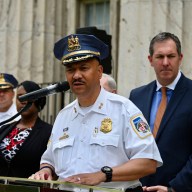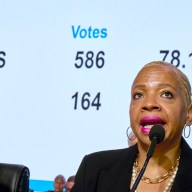HALIFAX, N.S. – The loud, plaintive cries of a mentally ill man ring out over the apparent crackle of an electrical stun gun as police repeatedly zap him with the device while he screams he did nothing wrong.
The exchange was captured by a surveillance camera at Halifax police headquarters on Nov. 21, 2007, as officers were booking Howard Hyde on allegations of assaulting his common-law spouse.
A two-minute piece of the footage, shown Friday at an inquiry looking into his death, shows several officers tackling Hyde in the booking area after he became agitated when they tried to remove a string from his shorts.
As he falls to the floor, Hyde continues to struggle with three officers, one of whom appears to take a stun gun from a drawer and deploy it.
“I’m sorry,” Hyde cries out in the video. “I didn’t do nothing wrong. What are you doing?”
Three officers try to subdue the short, stocky man, but he breaks free after being Tasered at least twice and bounds over the office counter and out into a hallway. The stun gun’s loud crack can be heard again as Hyde apologizes once more.
The gripping footage was shown at the end of the first week of testimony in the inquiry, which is looking into the way Hyde was treated by various health and justice officials after his arrest.
Hyde, who suffered from schizophrenia and had a lengthy criminal history, died at a nearby correctional facility 30 hours after being Tasered.
Hyde’s sister, Joanna Blair, sat in the courtroom with her eyes fixed on a screen playing the footage for the first time publicly as more than a dozen lawyers looked on silently.
“It’s very disturbing,” she said outside the court. “Audio and visually, it’s very disturbing.”
Another sequence shows Hyde, wearing only a pair of shorts and in bare feet, try to control him.
Earlier in the day, Const. Jonathan Edwards testified that after they subdued Hyde, they found no pulse or breathing signs and began chest compressions and CPR.
He was revived and paramedics took him to hospital.
The footage also shows Hyde arriving in the booking area, sitting calmly on a bench and talking to Edwards as he works at the counter.
“I got no power or control,” Hyde says as the faint strains of a country music song play in the background.
“I know you guys are good cops.”
He’s then led into a small holding cell, where he continually paces the length of the room for at least 15 minutes, stopping only briefly to talk to a legal-aid duty officer on the phone.
When he’s taken from the cell, an officer tells him he needs to be fingerprinted and photographed in an area off camera but with sound.
Minutes later, an officer can be heard calling, “Howard, Howard, what are you doing?” Several officers and Hyde are then seen falling into the booking area where he is Tasered.
Dan MacRury, the inquiry’s lead counsel, said the video is one piece of the extensive evidence that will be used to determine what happened to Hyde and if improvements can be made in the way people with mental illnesses are handled.
“It gives a clear idea of how the police acted on that occasion,” he said, adding the probe doesn’t have the mandate to assign blame.
“This inquiry is to look at what people did … and say, ‘Can we do a better job with the system or can we tweak policy or can we tweak training?”‘
The inquiry has heard testimony this week that police officers responding to the domestic assault call had been told by Hyde’s spouse that he was schizophrenic, had been off his medications for weeks and was acting erratically.
Lawyers have focused on that flow of information about his mental health, which doesn’t appear to have been shared with officers back at the station who were booking him.
It’s also not clear if officers told doctors treating Hyde that he was off his medications and was schizophrenic, but the inquiry has heard one doctor ordered he be returned to the hospital if he did not receive a psychiatric assessment.
Instead, he was returned to the police station to be booked on charges linked to the struggle there.
Counsel has also questioned whether police should have sent Hyde to hospital immediately after his arrest, rather than to headquarters.
















